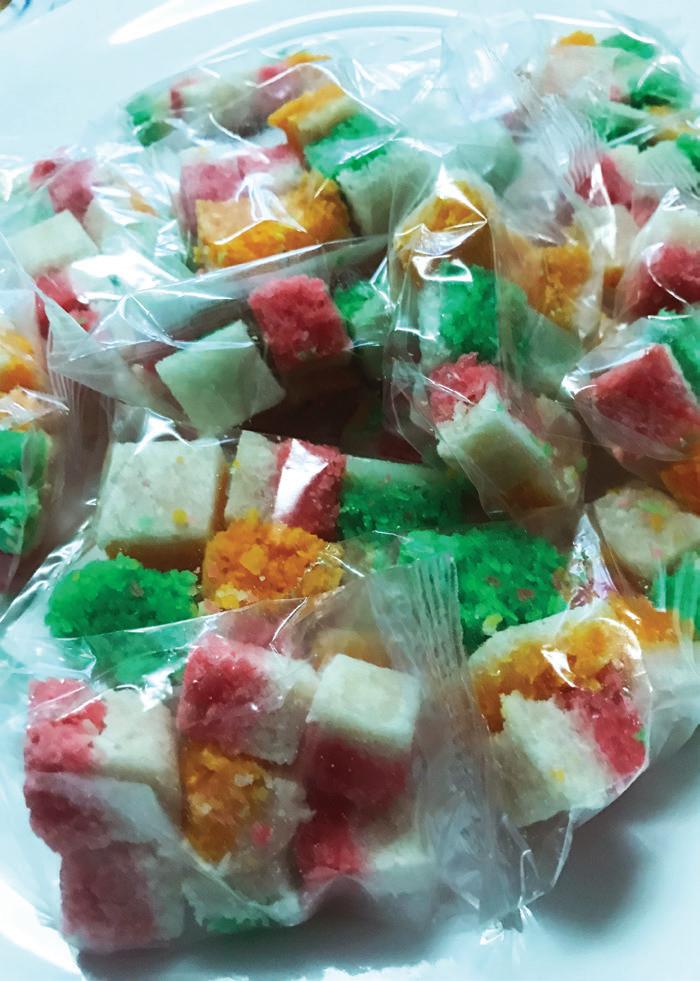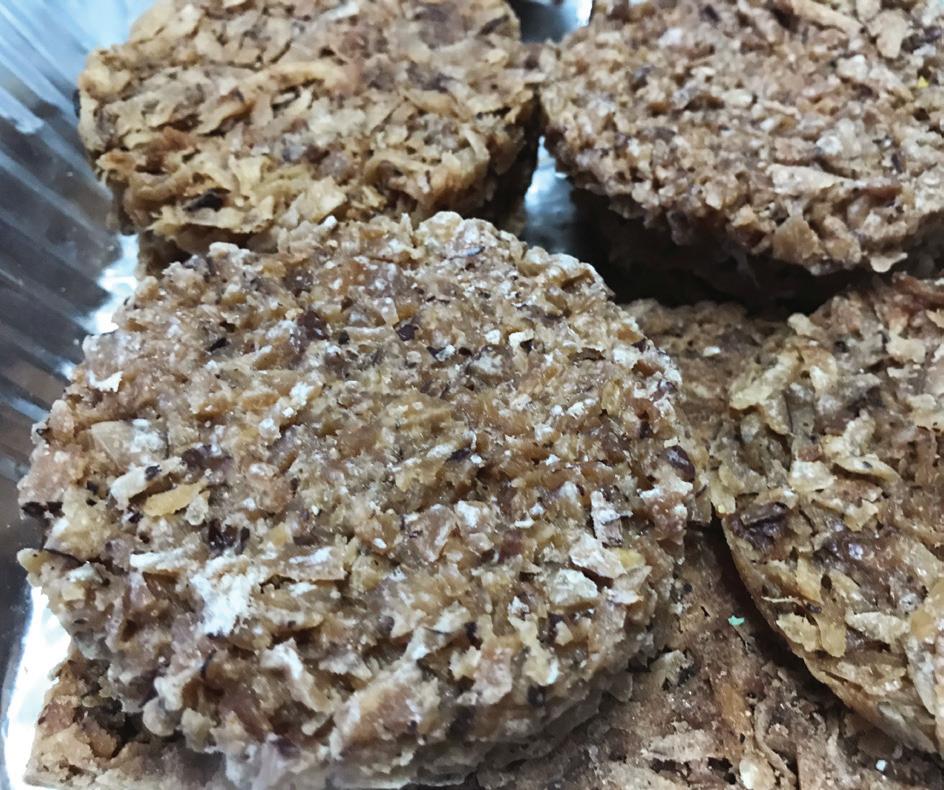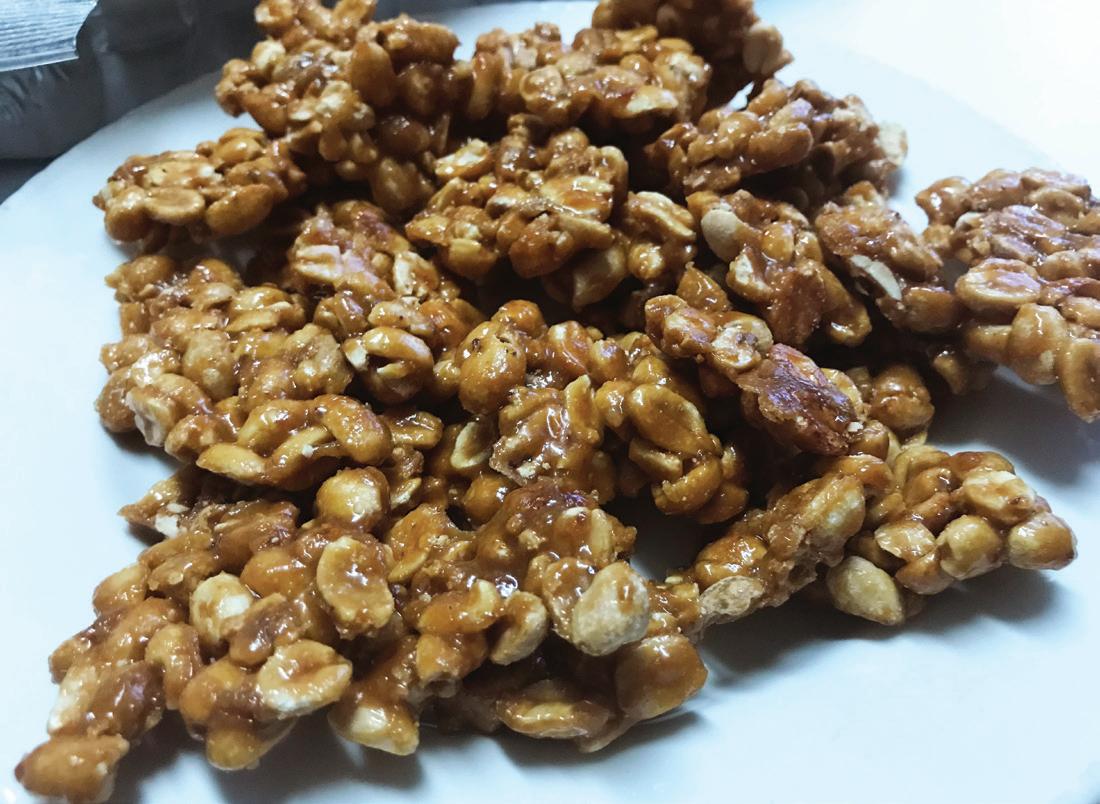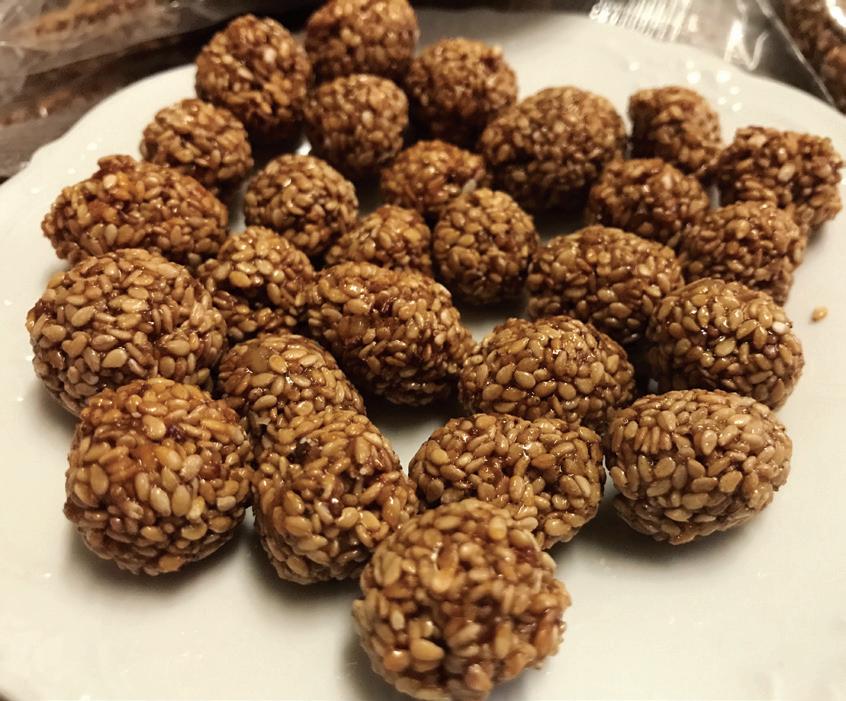
6 minute read
INDULGE YOUR SWEET TOOTH
By Shavaughn Moss
Photographs courtesy of Shavaughn Moss
Beth Stewart with her Bahamian Sweets
Beth Stewart, at age 79, is perpetuating Bahamian heritage by whipping up an assortment of quintessentially Bahamian sweets—benny cake, peanut cake, coconut cake and coconut cream—treats that have been staples in the community from time immemorial, and an age-old childhood indulgence. Once upon a time, these homey treats were to be had everywhere. People made the simple treats and sold them out of their homes for extra funds, or sold them at various festivals around the country. You paid about a quarter for the treat of your choice, which in most instances was stored in a cleaned out and repurposed mayonnaise jar, and happily went about your business, nibbling on your sweet indulgence.
But just how sweet treats such as benny cake, coconut cream, peanut cake and coconut cake came to be is a story long forgotten. Stewart herself doesn’t even know. All she knows is that for Bahamians across the generations, they’re treats they were introduced to in childhood and never thought of who invented such simple, delightful treats.
To be honest, I actually never really thought about who first came up with the idea of these treats, or even why. As a kid, I just enjoyed.
As I attempted to find anyone who would have an inkling about the origins of these sweet treats, I reached out to someone who has spoken out extensively on Bahamian cuisine in Patricia Glinton-Meicholas, as well as Stewart, from Beth’s Kitchen, who makes and sells these treats to this day—but neither of them knew B
Benny cake, peanut cake, coconut cake and coconut creams—quintessential Bahamian treats.
the history either as to who first came up with the ideas for the sweets. Both Stewart and Glinton-Meicholas say the sweet treats are embedded in Bahamian culture and are the result of both sides of Bahamian heritage—the African as well as the British, with the British coming into play specifically in reference to the coconut cream.
Glinton-Meicholas said people made use of what was available and that while the cream is British, the coconut was an addition by Bahamians.
Stewart said she doesn’t know how the recipes—which are simply benny seeds, coconut and peanuts cooked with sugar, and sometimes water—came to be. All she knows is Bahamians inherited it.
The one thing I went into this article knowing for certain is that benny, also known as sesame, has its origins in Africa and is the word African slaves used for the seeds which were brought on slave ships from West Africa.
As a matter of fact, Stewart—whose sweets are sold in a major grocery store and are in demand as favors for all types of celebrations, from weddings to birthday parties and even corporate affairs—proudly states on her label: “perpetuating our heritage”.
But don’t be fooled when you go in search of your treat, thinking you’re looking for a sweet that entails butter, flour or cream—because the names of these quintessential treats are actually a misnomer. In no way are any of them cake-like in any shape, form or fashion.
Researching this story gave me the opportunity to reminisce about these goodies that starred in my childhood but that I’ve rarely taken the time to enjoy in recent times.

Sinking my teeth into a just-made coconut cake and benny cake as I chatted with Stewart—where else but in the kitchen at her house where she makes her treats—I was flooded with memories of my childhood and visiting “cousins” in the Fox Hill community (one of the oldest Bahamian villages) in the eastern part of the island to take in the excitement of the annual Emancipation Day festivities held at what is referred to as the Fox Hill Parade Grounds. The Fox Hill Day Festival, the oldest festival in the country, held the second Tuesday in August annually, commemorates the freeing of enslaved Africans in the British colonies in 1834. During those forays of my youth, benny cakes, coconut cream and peanut cake were in abundance and to be had everywhere.
Stewart, who grew up in the quiet little village of Rolle Town, Exuma, remembers the older people in the settlement—grandmothers, goddies and aunties and other ladies in the community—producing the treats, which she said were always to be had at Christmas.
Stewart herself did not begin making the treats until 22 years ago when she found herself needing to raise funds to defray the cost of a trip to South Africa. Like Bahamians of the past who made the treats for extra money, she and her younger sister Edna Tinubu recalled how their cousin made the treats, and the rest, as they say, is history. Stewart and her sister have been making the treats ever since, and Stewart continues to make her treats under her Beth’s Kitchen label even as she approaches her eighth decade.
You can find Stewart most days in her kitchen whipping up batches of the sweets for which she’s become famous—so much so that she has even expanded on the original flavors of her youth, opting to add native flavors like mango, tamarind and pepper to give people options. As an enticement to younger generations to pique their interest in these homey treats, in today’s world of the mass-produced she opts to make them in shapes outside of the name, such as stars, birds and even fish. She also offers the benny cake in nugget form, which are bite-sized flat pieces, balls and sticks; and when she packages the balls and sticks together, she calls them “bat and balls” in reference to a popular yesteryear pastime of Bahamian youth.
She plays on the shape themes with her benny pepper pips as well as her peanut and benny pops which actually look like popcorn. Benny Cake


As for those coconut creams, which are usually red and white in color, Stewart has expanded that as well to offer what she calls her Junkanoo coconut cream, which is coconut cream in different colors. One thing she doesn’t stray from is packaging. She hand-cuts her homemade treats and always wraps them simply in plastic because she wants to retain the indigenous, homegrown look.
And there’s one more sweet treat that you will have to hook up with a local to source out because it’s not to be found in any grocery store—the “baggie” or “cup”. It’s one of those “beat the heat” sweet treats that all Bahamian children love during the summer months, and have to knock on the door of someone’s house to get, unless their parent makes it. It’s a simple mixture of the flavor Kool-Aid of your choice, water and sugar, frozen in a plastic cup or sandwich bag. In days gone by, it was a normal sight to see a kid sucking and licking on their frozen treat during those lazy, hazy hot days. UA
Peanut Cake

Benny Balls

Coconut Cake





